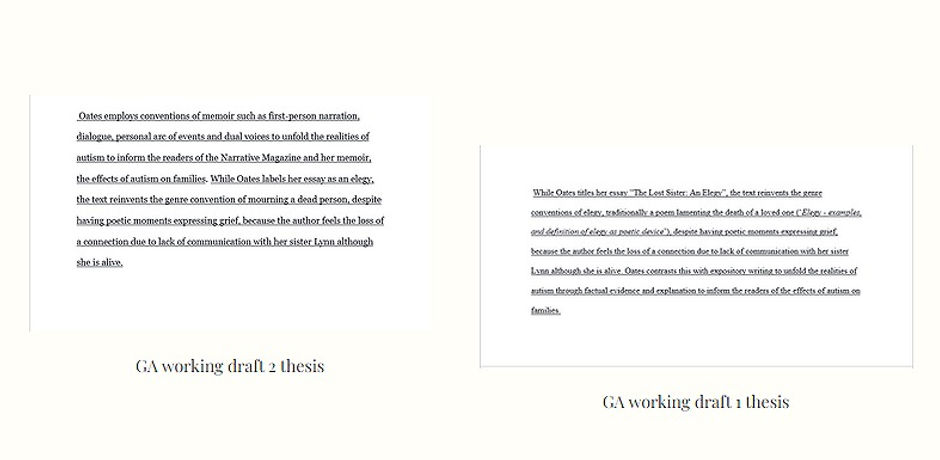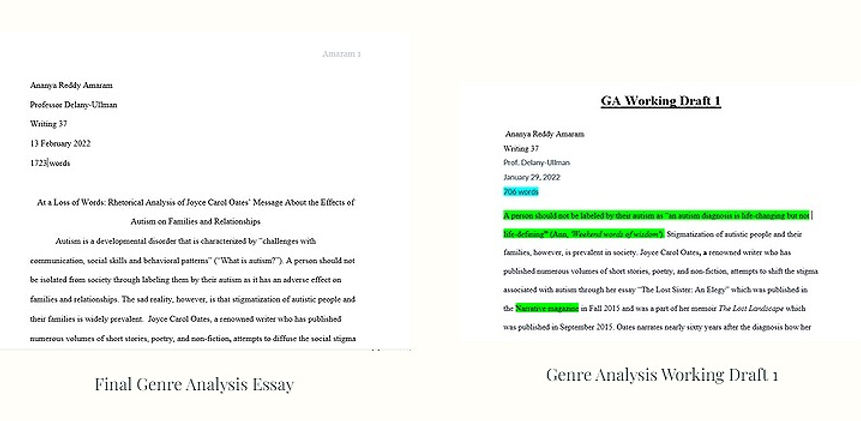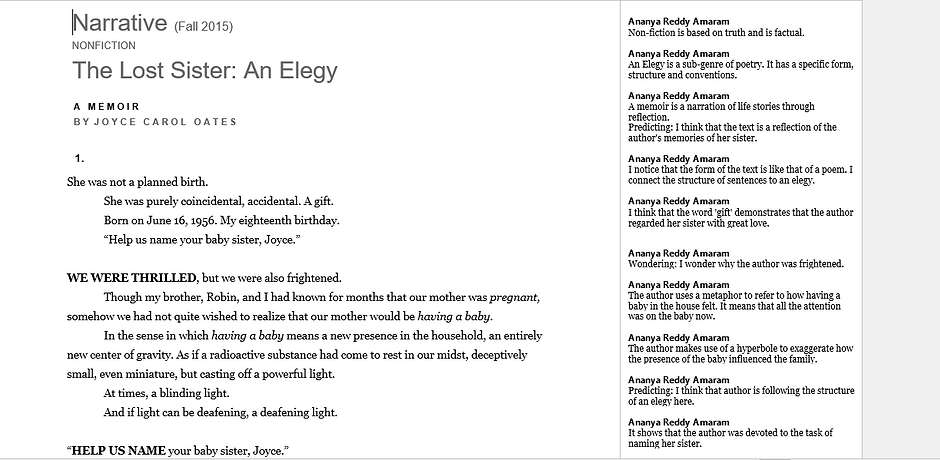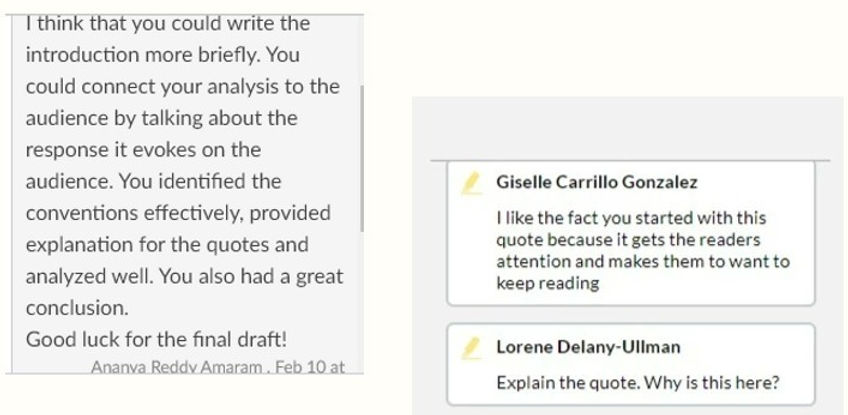Writing Showcase

Genre Analysis Essay
The writing showcase is a documentation of my journey of writing the rhetorical-based genre analysis essay. Genre Analysis involves identifying a text’s genre, its conventions, rhetoric and analyzing how they work together to convey a message to the audience. The Genre Analysis essay presents a thesis analyzing how the different genre conventions work together to achieve a rhetorical purpose and supports the thesis with evidence from primary and secondary sources of readings.
Writing the Genre Analysis essay involved reading primary and secondary source texts using metacognitive reading tools to understand the text thoroughly, writing two exploratory drafts, two working drafts and revising the essay based on feedback from peer review. The first six weeks of Writing 37 culminated in a 1500 to 1800-word final genre analysis essay which analyzed how the representations of genre conventions in the text achieve a specific purpose, invite a particular audience response, and address a particular social, cultural, or political issue (message).
Here is a link to my Final Genre Analysis Essay on "The Lost Sister: An Elegy" by Joyce Carol Oates.
The following artifacts are the curations of my learning moments which acted as stepping stones in traversing the journey of writing the genre analysis essay.
Artifact 1
Learning How to Write an Effective Thesis

Side by Side Comparison of the revised thesis from the Second Working Draft and the First Working Draft demonstrating how I learned to write an effective thesis.
The Genre Analysis Essay focuses on a thesis that presents an argument about rhetoric and genre which is supported with evidence from primary and secondary sources in subsequent paragraphs. The thesis identifies the elements of the rhetorical triangle – rhetor, message and audience. Comparing my thesis from the first and second draft demonstrates how I learned to revise my thesis statement through the thesis workshop in class. I learned how to revise my thesis to meet the Thesis and Argument requirement of the Genre Analysis Essay rubric which states that the thesis should be arguable, rhetorical, specific, and insightful about the topic and texts. I implemented the suggestions I received from my peers during the workshop to revise my thesis to include specific genre conventions for each genre and structured the conventions in the order that I analyzed them in my essay. Moreover, evaluating my peer’s thesis statements helped me identify the essential features of a thesis and thereby incorporate them into my work. Although writing an arguable thesis was challenging, the workshop provided the tools to help me formulate effective thesis statements for future writing assignments. I feel, however, that my thesis does not show a depth of thinking about the text and wish I also learned how to make my thesis more sophisticated. Learning how to write an effective thesis helped me develop my critical writing skills as it made me learn how to develop an academic essay with the focus on the thesis statement. This learning gave me insight on how to structure and organize my thesis to present the evidence for the claims in academic writing. Learning how to write a thesis is important to my academic ethos and in becoming a member of the academic discourse community because academic writings such as research papers are often thesis driven. Writing an effective thesis was therefore a stepping stone to writing an effective genre analysis essay.
Artifact 2
Learning How to Draft and Craft

Side by Side Comparison of The Final Genre Analysis Essay and The First Working Draft demonstrating how I learned to draft and craft.
Drafting is the process of developing writing through multiple drafts. In preparation for the Final Genre Analysis Essay, we had to write two exploratory drafts and two working drafts. The exploratory drafts helped me focus on identifying a genre and its conventions while the working drafts developed my analysis of how the conventions worked together to achieve a specific rhetorical purpose. The comparison between the Final Genre Analysis and the First Working Draft demonstrates how I have made practical use of feedback from peers and the instructor to revise the essay effectively over multiple drafts as per the Revision and Process requirement of the Genre Analysis Rubric. The drafting process helped me write and revise the essay one step at a time, starting with only the introduction in the first working draft, leading up to the analysis in the second working draft and finally the conclusion in the final essay. It also helped me split my work and not feel overwhelmed as I was able to add elements to my essay over time. This assignment helped me strengthen my revision skills as a critical writer as I had to improvise on each draft based on the feedback received from my peers and instructor. The feedback from peer review on each draft helped improve the final essay over the course of 6 weeks. This learning is important because it gave me insight on how to incrementally approach long college-level writings with revision over multiple drafts than having to write the entire assignment at once. It also helped me develop into a member of the academic discourse community because I learned how to engage in the ongoing discussion on genre by drafting and developing an academic essay. Learning how to draft and develop my work was therefore a stepping stone to writing a fully developed Genre Analysis Essay.
Artifact 3
Learning How to Use Metacognitive Reading Tools

My Annotations of "The Lost Sister: An Elegy" demonstrating how I learned to use metacognitive reading tools .
During the first two weeks of Writing 37, I have worked on various readings, namely, "Navigating Genres" by Kerry Dirk, "The Lost Sister: An Elegy" by Joyce Carol Oates, and "The Meandering River: An Overview of Subgenres of Creative Non-fiction" by Sue William Silverman that have helped me write the drafts for my Genre Analysis assignment. I learned how to use the metacognitive reading techniques and engage with the text which helped me employ certain Habits of the Mind such as Metacognition and Engagement. I also learned how to use the annotations from the readings as an outline of key points to integrate primary and secondary sources of evidence as support to my claims in the essay as per the course objectives. Learning how to integrate sources provided an insight on how to provide textual evidence for my analysis in Genre Analysis essay. The metacognitive skills helped me analyze the text at a deeper level and identify the conventional features of a genre, specifically a memoir, used in the text. This learning is important because it prepared me for the Final Genre Analysis Essay as it provided a framework for the analysis of genre and rhetoric. I was able to refer to my annotations instead of having to read the entire essay before writing the essay. Metacognitive reading assignments helped me develop my critical reading skills as they helped me slow down and comprehend the text effectively. This helped me improve my academic ethos as I learnt how to make annotations which is an essential feature of the academic discourse community. Learning how to use metacognitive reading tools was therefore a stepping stone to presenting the evidence for the Genre Analysis Essay.
Artifact 4
Learning How to Implement Feedback

Snapshot of the Peer Review I gave and received on the Second Working Draft of the Genre Analysis Essay demonstrating how I learned to implement feedback
Peer review is the process of giving and receiving constructive feedback on the writing after review from other members of the academic discourse community. I learned how to give productive feedback on my peers' writing as well as implement the feedback I received from my peers and professor according to the course objectives. Peer review helped me improve my critical reading and analysis skills as it required me to analyze others' work to identify connections and questions to offer feedback. It also exposed me to different perspectives and writing styles. Furthermore, the quality of my writing was enhanced as it was subject to the scrutiny of other writers and readers. From the comments I received from my peers on my second working draft, I was able to identify areas where I could revise my writing and receive ideas on how to make my writing more engaging. The highlighted annotations are the suggestions I received from my peers and instructor after the conference. The positive feedback I received also helped build my confidence in my writing skills and was a source of encouragement. Peer review strengthens our ethos as rhetors as our published work is often reviewed by qualified writers, thereby, giving us credibility as communicators. This learning was important as my work was reviewed by various people who helped me by offering different kinds of opinions on my work. It helped me become a member of the academic discourse community as I was able to engage with other members by actively participate in peer review. Learning how to implement feedback from peer review was therefore a stepping stone to writing a revised and polished Genre Analysis Essay.
A Comparison
Imitation Project Multimodal Memoir vs Genre Analysis Essay
Artifact 1
Comparing Voices : Experienced and Innocent Voice vs Objective Voice

Comparing the conventions of experienced and innocent voice in the IP Multimodal Memoir to the objective voice in the Genre Analysis Essay
The IP Multimodal Memoir employs the use of first-person narrative with the use of personal pronouns to help the readers relate to the author. It offers the readers a glimpse into the mind of the rhetor and helps them understand the writer’s perspective. It allows the readers to experience the emotions that the writer had felt and thereby, appeals to the pathos of the audience. It follows the conventions of a memoir by employing the use of the innocent voice which narrates the events and the experienced voice which reflects on the events. The use of dual voices adds a refinement of the author’s perspectives from the past and the present. This allows the writer to introduce emotions and express feelings or opinions. The Genre Analysis Essay, on the other hand, employs the use of third person narrative to write objectively about the thesis using evidence from sources to appeal logically to the readers. The opinions and beliefs of the writer are not included in the writing. The citation of quotes from the sources adds credibility to the text and therefore, influence the audience to accept the message the writer is trying to convey through the essay. The convention of using the third person narrative, hence, is essential to the logos of the communication. Therefore, the third person narrative is an element of formal academic writing. The use of the different kinds of narrative techniques ultimately develops the persona of the rhetor and conveys the message to the audience although it is done through different rhetorical strategies.
Artifact 2
Comparing Messages : Implicit and Explicit

Comparing the implicit message in the IP Multimodal Memoir to the explicit message in the Genre Analysis Essay
The message is conveyed implicitly through the narration of a significant moment of life in the IP Multimodal Memoir. The message is supported by memories from the author’s past and emotions evoked by the author in the readers. The IP Multimodal Memoir addresses a social issue to the audience through the theme and message, causing them to reflect on the text. The readers are allowed to develop their own opinions and understanding of the text. The message is not clearly presented to the audience and therefore, the interpretation of the message is open. In my memoir, the message regarding advocacy of mental health is conveyed through the overarching theme of identity and the narration of my experience and struggles with anxiety. The IP Memoir provides information about the message to the readers by assuming the readers know the topic the rhetor chose to convey. On the other hand, in the Genre Analysis Essay the message the rhetor is trying to convey is stated explicitly through the thesis. The message is supported by concrete evidence of quotes from a source to support the author’s argument. The reader is convinced to accept the message as a fact although the thesis is arguable. The essay focuses on reinforcing the message through paragraphs that connect to the thesis. The GA Essay assumes that the audience is unaware of the terms and topics utilized in the essay and thereby, provided information about the analysis of conventions .The Genre Analysis Essay’s message logically influences the readers as opposed to how the IP Memoir’s message emotionally influences the readers. The message of the GA Essay does not address any significant issue, rather it provides an informative argument about the analysis of genre and genre conventions. My GA Essay conveys the information about the genre conventions of Memoir and Elegy through the analysis of sources.
Conclusion
My Genre Analysis on Joyce Carol Oates’ “The Lost Sister: An Elegy” is a rhetorical analysis of how the genre conventions of a memoir and elegy complement each other in delivering the author’ message to the audience of The Narrative Magazine about the effects of autism on families and relationships. I feel that I have successfully accomplished writing a thesis driven argument by maintaining a clear relationship between my thesis statement and the analysis in each paragraph. Writing an argument that supports the thesis was difficult but I was able to develop an effective thesis with the help of writing workshops in the class. Although I found it quite challenging to write the analysis for each quote that I have included as evidence of a genre convention, I persevered myself to go deeper and write stronger analysis that connected the quotes to the audience and the message. In doing so, I learned how to structure the essays and write cohesive paragraphs that connect to the thesis. I learnt how to revise my essay with the help of all the weekly assignments in a systematic manner. However, I think that I could have improved the conclusion to mention in detail about how the two genres worked together in achieving a rhetorical purpose. I also think that in certain parts of my essay, I should have integrated the sources more smoothly using the Three-Step Method of Integrating Sources. The Genre Analysis Essay helped me learn how to navigate unfamiliar genres and establish myself as a member of the academic discourse community, therefore, preparing me for future writing classes.
Reflection
All forms of communication can be classified into genres. Every genre has distinctive features, audience, and purpose. As such choosing a genre is a rhetorical choice which governs how the text is perceived. People often determine what to read based on the genre of text, their preferences and expectations. Therefore, genre awareness is integral in writing and communication.
I have significantly improved my genre awareness through Writing 37 with the help of the various readings such as “Navigating Genres” by Kerry Dirk and “Meandering River: An Overview of Sub-genres of Creative Non-fiction” by Sue William Silverman. The readings have provided a foundation on top of which I could develop my Genre Analysis Essay. I have learned how to analyze the conventions of a particular genre through metacognitive reading, annotating, writing the Genre Analysis Essay and finally applying my knowledge of genre to the Imitation Project Multimodal Memoir. I now have the ability to analyze unfamiliar genres with the critical reading and writing skills I developed in the class.
Understanding the concept of genre will enable me to make impactful rhetorical choices in writing and communication. It allows me to interpret, analyze, and compare the genre conventions of various kinds of writings. Genre conventions also serve as guidelines for rhetors in approaching a genre by laying down the expectations of the discourse community that would likely be interested in reading a particular genre. Learning how to identify a text’s genre and its conventions will therefore assist me in future writing classes at UCI where I will be expected to produce academic essays which meet the requirements of the academic discourse community or beyond the classroom in common communication such as writing a text, article or an email and presentations.
